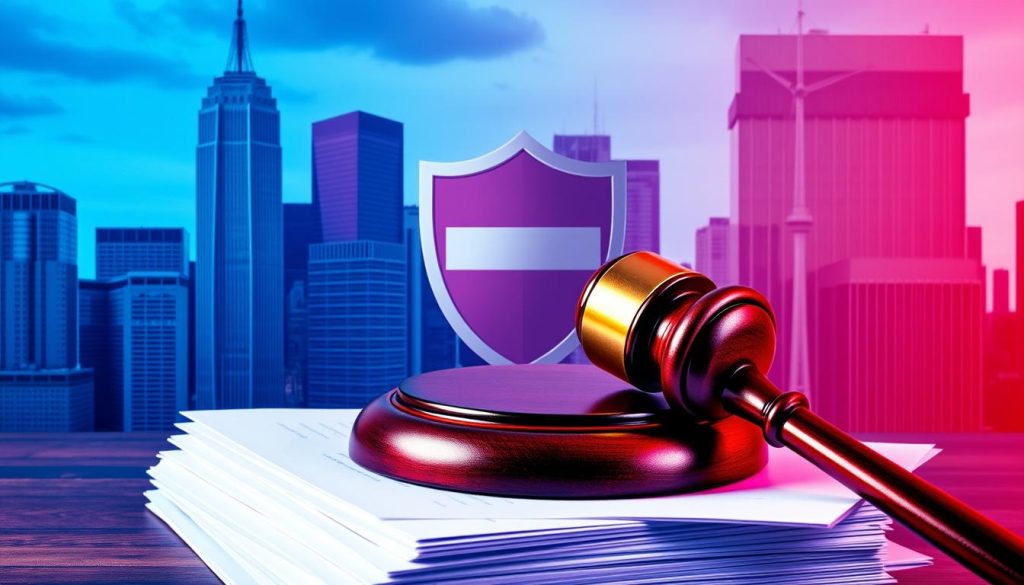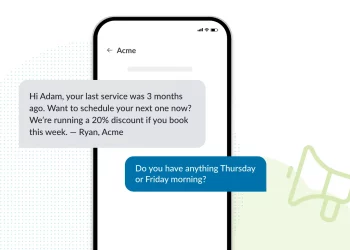Disclaimer: This is not legal advice and is for informational purposes only. It is not meant to replace advice from qualified legal counsel. You are fully responsible for all legal matters.
Did you know businesses could face fines of up to $1,500 per unsolicited call or text message under the TCPA? This can add up to millions in penalties. Companies need to grasp the details of TCPA compliance.
The Telephone Consumer Protection Act aims to shield consumers from unwanted calls and texts. But for businesses, it’s a legal challenge. Ignoring or not following TCPA rules can lead to big financial losses and harm a company’s reputation.
Key Takeaways
- Businesses can be fined up to $1,500 per unsolicited call or text message.
- Understanding and adhering to TCPA regulations is essential to avoid severe penalties.
- Common violations include unsolicited text messages, unauthorized robocalls, and improper auto-dialer use.
- Non-compliance can lead to substantial financial penalties and reputational damage.
- Proactive measures such as obtaining proper consent and maintaining documentation can help stay compliant.
Understanding the TCPA (Telephone Consumer Protection Act)

The Telephone Consumer Protection Act (TCPA) is a key law that protects consumers from unwanted calls and texts. Businesses must know because breaking the law can lead to big penalties.
What is the TCPA?
The TCPA controls telemarketing calls, texts, and auto-dialing systems. It was created in 1991 to protect privacy by limiting call times and requiring do-not-call lists. Today, it’s more important than ever because of new tech.
History and Purpose of the TCPA
The TCPA started to fight against annoying telemarketing calls. Over time, it has grown to include texts and automated systems. The FCC has made updates to keep up with technology.
This shows why breaking the TCPA can have serious consequences. Businesses must follow the law to avoid fines and damage to their reputation.
Common Types of TCPA Violations
It’s key for businesses to know about TCPA violations to stay compliant and avoid big fines. These often happen when communications are sent without the right consent. Here are some common TCPA violations:
Unsolicited Text Messages
Businesses sending texts without consent is a big TCPA issue. This can lead to big fines if consumers file complaints. Businesses need to have explicit consent before sending texts to avoid fines.
Unauthorized Robocalls
Robocalls to consumers without their consent are another big TCPA problem. These calls can cause big fines, even if they happen often or at bad times. Companies must get clear consent before making calls and offer an easy way to opt-out.
Improper Use of Auto-Dialers
Using auto-dialers without consent is a big TCPA issue. Auto-dialers calling without permission can lead to big fines. Companies must ensure their systems are set up right to avoid these calls and fines.
The Financial Impact of TCPA Penalties
Not following the Telephone Consumer Protection Act (TCPA) can hurt a business’s wallet big time. The penalties for breaking the TCPA can be huge. It’s key for companies to know how much they could lose.
Overview of TCPA Fines
The cost of breaking the TCPA can vary a lot. It depends on how often and what kind of mistakes are made. For example, fines can go up to $500 per mistake. If it’s a serious mistake, it can be $1,500.
These fines can add up fast. They can put a big dent in a company’s finances, even for big companies.
Case Studies of Severe TCPA Penalties
There are many examples of big fines for TCPA violations. In 2017, the FTC fined Dish Network $280 million. This was for making millions of calls without permission.
Time Warner Cable also faced a big fine. They had to pay $229,500 to someone for unwanted robocalls.
These cases show why following TCPA rules is so important. Companies need to be careful to avoid big financial losses.
Immediate Steps to Take if You Suspect a Violation

You must act fast if you think your business might have broken the TCPA rules. This is to avoid big penalties and keep your company’s good name. Here’s what to do if you think your business might be in trouble:
- Initial Assessment: First, check if you have a problem. The details include what happened, when, and who it affected.
- Conduct an Internal Audit: Do a deep dive into your records. This will help you see how big the issue is and when it started.
- Seek Legal Advice: Talk to a lawyer who knows about TCPA rules. They can tell you what penalties you might face and how to fix it legally.
- Notify Relevant Stakeholders: Tell everyone in your company about the problem. Make sure they know how serious it is and what to do next.
- Implement Corrective Actions: Fix the problem quickly. This might mean stopping certain actions, updating forms, training staff, or changing how you follow rules.
It’s key to keep following rules closely to avoid penalties. Make sure your company always follows TCPA rules well.
| Steps | Actions |
|---|---|
| Initial Assessment | Evaluate details of the potential violation |
| Internal Audit | Review compliance documents and logs |
| Seek Legal Advice | Consult with a TCPA expert |
| Notify Stakeholders | Inform and prepare internal teams |
| Implement Corrective Actions | Take immediate corrective measures |
Acting fast and being careful can lessen the damage from suspected violations. By following these steps, you can protect your business from big financial losses.
Penalties for Violating the TCPA Can Be Severe
Understanding the consequences of not following the Telephone Consumer Protection Act (TCPA) is key. The penalties for violating the TCPA can be severe. Fines can be from $500 to $1,500 for each unwanted call or message. These fines can add up quickly, making it costly for large campaigns.
Companies also face class action lawsuits, which can lead to huge settlements. These lawsuits cost a lot of money and harm a company’s reputation. This can hurt a company for a long time.
Companies might also get injunctions. These limit what they can do and require strict rules to follow. Not following the rules can hurt a company’s future and its reputation.
Here’s a closer look at potential financial repercussions:
| Violation Type | Statutory Damages | Potential Additional Costs |
|---|---|---|
| Unsolicited Calls | $500 – $1,500 per call | Legal fees, Reputation damage |
| Unsolicited Text Messages | $500 – $1,500 per message | Loss of customer trust, Legal fees |
| Non-Compliant Auto-Dialers | $500 – $1,500 per instance | Class action settlements, Compliance overhauls |
In conclusion, breaking the TCPA rules can have big consequences. It affects a company’s money now and its future. Companies should focus on following the rules to avoid these big problems.
Best Practices for TCPA Compliance
Keeping up with TCPA rules is key for businesses to avoid big fines and keep customer trust. By following the best practices for getting consent and keeping detailed records, companies can lower the chance of facing TCPA penalties.
Obtaining Proper Consent
Getting the right consent is the heart of TCPA compliance. Companies must get clear, written consent from customers before starting any telemarketing. This means:
- Telling customers the reason for the call.
- Letting them choose to sign up on their own.
- Making sure the consent is for the exact type of call.
Following these steps carefully can help businesses avoid TCPA fines.
Maintaining Compliance Documentation
Keeping detailed records is vital to show TCPA compliance. Having complete records of consent forms, call logs, and training can be strong proof in legal cases. Important records include:
- Proof of consumer consent.
- Records of all telemarketing calls.
- Proof of staff training on compliance.
These practices not only keep companies in line but also help defend against TCPA fines. By using these methods, businesses can better handle the complex world of telemarketing laws.
How to Avoid Common TCPA Pitfalls
To avoid TCPA violations, you need a mix of training and regular checks. This ensures your team knows the TCPA rules well. It helps lower the chance of breaking them.
Training Your Staff
It’s key to teach your team about TCPA rules and what happens if they don’t follow them. They should know how to get consent right and handle customer info carefully. They also need to know what they can and can’t do in communication.
- Regular workshops and webinars to keep staff updated on the latest TCPA regulations.
- Interactive training sessions to ensure employees can apply their knowledge in practical scenarios.
- Accessible resources, such as manuals and guidelines, for ongoing reference.
Regular Compliance Audits
Doing regular audits is vital to find and fix problems early. These audits help spot any issues that could lead to TCPA violations.
Here’s how to do it right:
- Set up a solid audit schedule to keep things consistent.
- Use detailed checklists that cover all TCPA compliance areas.
- Look over and check communication records to make sure they follow TCPA rules.
By focusing on training and audits, you can greatly reduce the risk of TCPA violations. This makes sure your communication stays smooth and follows the rules.
Tools and Technologies to Support TCPA Compliance
Businesses need modern tools and technologies to follow the Telephone Consumer Protection Act (TCPA). Not following the TCPA can lead to big tcpa penalties and tcpa fines. Using the right tools can help avoid these risks and keep businesses in line with the law.
Compliance Software Solutions
Compliance software helps businesses follow TCPA rules by checking consent in real-time. These tools have features like:
- Real-time consent tracking
- Comprehensive audit trails
- Automated updates to reflect regulatory changes
Companies like Neustar and Twilio offer strong compliance tools. These tools help businesses avoid expensive tcpa penalties and stay compliant.
Effective Monitoring Systems
Monitoring systems are key for tracking communication and catching potential issues. They help businesses avoid tcpa fines by:
- Keeping an eye on communication channels
- Alerting for any odd activities
- Providing detailed reports on compliance
Tools like CallMiner and NICE Nexidia are great for keeping communication practices in check. They help prevent big tcpa penalties.
| Feature | Compliance Software Solutions | Effective Monitoring Systems |
|---|---|---|
| Primary Function | Real-time consent verification | Continuous tracking of communication patterns |
| Key Benefit | Avoidance of tcpa penalties | Prevention of tcpa fines |
| Leading Providers | Neustar, Twilio | CallMiner, NICE Nexidia |
In short, investing in the latest compliance software and monitoring systems is key for businesses. These tools help avoid big tcpa penalties and tcpa fines. They ensure businesses communicate lawfully and smoothly.
Legal Counsel and Advice for TCPA Compliance
Dealing with the Telephone Consumer Protection Act (TCPA) can be tough. Getting help from lawyers who know TCPA law is key. They help businesses avoid violations and lower penalties. It’s important to know that penalties for TCPA violations can hurt a business a lot. So, getting legal advice is not just helpful, it’s necessary.
Lawyers with TCPA knowledge can guide you through its complex rules. They help with getting the right consent from customers and setting up strong compliance plans. They also help create documents to defend against non-compliance claims.
- Review and interpretation of TCPA law
- Strategizing and implementing compliance measures
- Creating comprehensive documentation to support compliance
Getting legal advice early can prevent big penalties. Instead of risking fines and damage to reputation, working with lawyers ensures you follow TCPA rules.
It’s vital to understand the role of specialized legal counsel. Here are some key services they offer:
| Legal Service | Description |
|---|---|
| Consultation and Assessment | Reviews your communication practices to spot risks. |
| Compliance Training | Teaches staff about TCPA rules and how to follow them. |
| Legal Representation | Defends you if there’s a complaint, using legal strategies to lessen penalties. |
Investing in legal advice for TCPA compliance can greatly lower the risk of fines. It helps protect your business and builds trust with customers.
Regular Updates and Staying Informed on TCPA Regulations
Keeping up with TCPA changes and penalties is key for any business. Knowing the latest helps avoid big fines. It’s all about staying ahead in a fast-changing world.
Subscribing to Legal Bulletins
To stay informed, sign up for legal bulletins from trusted sources. They share news on TCPA updates, enforcement, and penalties. Law firms and industry pubs often have these services.
Attending Industry Conferences
Going to industry conferences is also smart. You get expert advice and meet others who deal with TCPA issues. Events by the American Bar Association or telecom groups are great places to learn.
“Attending industry conferences offers not only the latest on TCPA enforcement but also strategies to safeguard your organization against hefty penalties.” — American Bar Association
Here’s a look at the pros of legal bulletins versus industry conferences:
| Subscribing to Legal Bulletins | Attending Industry Conferences |
|---|---|
|
|
Understanding the Role of the FCC in TCPA Enforcement
The Federal Communications Commission (FCC) is key in enforcing the Telephone Consumer Protection Act (TCPA). This act protects consumers from unwanted calls and texts. It’s important to know the FCC’s role and recent decisions that shape current practices.
FCC’s Authority and Actions
The FCC was given the power by Congress to enforce the TCPA. They can make rules and guide companies on how to follow them. Their main goal is to keep telemarketing respectful of consumer privacy.
The FCC investigates, fines, and orders fixes when rules are broken. Companies need to be careful because penalties for violating the tcpa can be severe. This includes big fines.
Recent FCC TCPA Rulings
Recent FCC decisions have made the TCPA clearer for businesses and consumers. They’ve defined auto-dialers better, made consent for robocalls stricter, and reaffirmed consumer rights. Keeping up with these changes is crucial.
Staying informed is key because penalties for violating the tcpa can be severe. These penalties can hurt a business’s operations for a long time.
Conclusion
Following the Telephone Consumer Protection Act (TCPA) rules is crucial for any business that uses telemarketing, text messages, or auto-dialing. This article has shown that breaking these rules can lead to big financial losses. It’s important to be careful and take steps to follow these laws.
Knowing about TCPA violations, the big fines, and how to stay compliant can help businesses avoid problems. Using software, doing audits, and getting legal advice are good ways to stay in line. These actions help build a strong compliance plan.
It is key to keep up with TCPA changes and knowing the FCC’s role in enforcing them. This knowledge helps businesses deal with complex rules. In the end, following TCPA rules is worth protecting a company’s reputation and keeping operations running smoothly.
FAQ
What is the TCPA?
The TCPA, or Telephone Consumer Protection Act, was passed in 1991. It aims to control telemarketing calls and messages. It protects consumers from unwanted communications.
What are the common penalties for TCPA violations?
Breaking the TCPA can cost a lot. Fines range from $500 to $1,500 per call or message. This can lead to big financial losses.
Can you provide examples of severe TCPA penalties?
Yes. Companies like DISH Network and Carnival Corporation have faced huge fines. These cases show the importance of following the law.
What are some common types of TCPA violations?
Common violations include sending texts without consent and making robocalls without permission. It’s essential to get consent and follow the rules.
What steps should a business take if they suspect a TCPA violation?
Businesses should audit themselves, seek legal advice, and fix the problem if a violation is suspected. Quick action can reduce penalties.
How can businesses maintain TCPA compliance?
To stay compliant, businesses must get consent, keep records, train staff, and audit regularly. Using compliance software can also help.
What role does the FCC play in enforcing the TCPA?
The FCC enforces the TCPA by investigating, fining, and making rulings. Businesses should keep up with FCC updates to stay compliant.
Why is obtaining expert legal counsel important for TCPA compliance?
Legal experts guide businesses through TCPA rules and defend against violations. They help ensure businesses follow the law and have firm compliance plans.
How can businesses stay updated on TCPA regulations?
Businesses can stay informed by subscribing to legal bulletins, attending conferences, and joining professional networks. These sources offer updates on laws and best practices.














